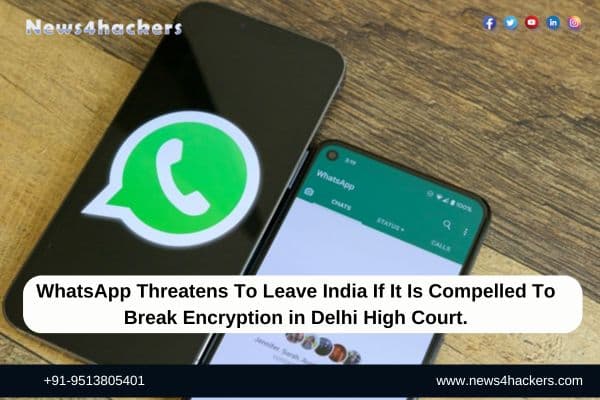WhatsApp Threatens To Leave India If It Is Compelled To Break Encryption in Delhi High Court.

WhatsApp Threatens To Leave India If It Is Compelled To Break Encryption in Delhi High Court.
In the Delhi High Court, the social messaging giant, WhatsApp stated that it may consider withdrawing from the Indian market if the Information Technology Rules 2021 compel it to compromise its end-to-end encryption.

New Delhi: WhatsApp is widely recognized as one of the most popular messaging platforms on an international scale. The Meta-owned company often asserts that any information its users disclose remains confidential between them and the recipient, due to the end-to-end encryption that safeguards the communications. “No matter what you share, it remains private.”
Your private communications are safeguarded with end-to-end encryption. “In order to assure you of our dedication, the company specified on its Frequently Asked Questions page that we label each chat and will never compromise this security.” The Information Technology Rules 2021 of the Indian Government, on the other hand, could compel WhatsApp to compromise end-to-end encryption.

Recent reports indicate that during a hearing before the High Court, WhatsApp threatened to leave India if end-to-end encryption could not be broken. Concisely summarized in main factors:

- The government of India unveiled the Information Technology Rules 2021 in February 2021. These regulations comprised intermediary guidelines and a code of conduct for digital media. The government had firmly advocated for the ability to ascertain the originators of a message. This meant that messaging platforms employing end-to-end encryption, such as WhatsApp, Signal, and Telegram, would be required to breach the encryption in order to comply with the government’s new rule.

- In a recent proceeding before the Delhi High Court, WhatsApp and its parent organization Meta (previously known as Facebook Inc.) challenged the Information Technology (IT) regulations for 2021. Significant concerns were raised by WhatsApp’s legal counsel, who stated that the company might consider withdrawing from the Indian market if it were forced to compromise the encryption that safeguards user communications. The platform’s user trust and appeal are founded upon its end-to-end encryption, which serves as a testament to its dedication to safeguarding user privacy.

- A lawyer for WhatsApp, TejasKaria, presented an argument in front of a bench that included Justice ManmeetPritam Singh Arora and Acting Chief Justice Manmohan. Compelling WhatsApp to decrypt messages, according to Karia, would profoundly alter the platform’s privacy guarantees and could potentially compromise the privacy of users and millions of messages. The author emphasized the practical and moral complexities associated with this mandate, specifically mentioning the retention and possible decryption of enormous quantities of confidential communications.

- In replying, the court recognized the intricacy of reconciling regulatory obligations with privacy rights, emphasizing that privacy is not absolute and that modifications may be required. Furthermore, Karia asserted that comparable legislation mandating the decryption of messages does not exist in any other country on earth, not even in nations renowned for their rigorous internet regulations such as Brazil.

- During the course of the discourse, the legal representative for the Indian government advocated for the regulations, emphasizing their criticality in circumstances where platforms could potentially be exploited to disseminate objectionable material, such as in the midst of communal unrest. The next scheduled hearing by the court is on August 14.
About The Author:
Yogesh Naager is a content marketer who specializes in the cybersecurity and B2B space. Besides writing for the News4Hackers blog, he’s also written for brands including CollegeDunia, Utsav Fashion, and NASSCOM. Naager entered the field of content in an unusual way. He began his career as an insurance sales executive, where he developed an interest in simplifying difficult concepts. He also combines this interest with a love of narrative, which makes him a good writer in the cybersecurity field. In the bottom line, he frequently writes for Craw Security.
READ MORE NEWS HERE





